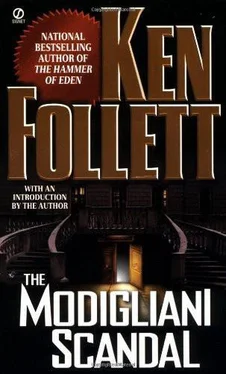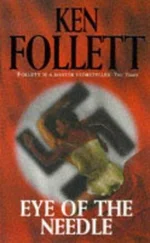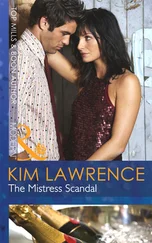Willow looked toward the window out of a comer of his eye—a sign, Lampeth knew, that he was straining his memory. ″Hasn′t Cardwell got two or three Modiglianis?″ he said eventually.
″That′s right.″ It was no surprise to Lampeth that Willow knew it: part of a top art dealer′s job was to know where hundreds of paintings were, who they belonged to, and how much they were worth.
ʺInteresting,ʺ Willow continued. ″I had word from Bonn yesterday, after you had left. A collection of Modigliani′s sketches is on the market.″
″What sort?″
″Pencil sketches, for sculptures. They aren′t on the open market yet, of course. We can have them if we want them.″
″Good. We′ll buy them anyway—I think Modigliani is due for a rise in value. He′s been underrated for a while, you know, because he doesn′t fit into a neat category.″
Willow stood up. ″I′ll get on to my contact and tell him to buy. And if Usher inquires, I′ll stall him.″
″Yes. Be nice to him.″
Willow went out, and Lampeth pulled toward him a wire tray containing the morning′s post. He picked up an envelope, its top slit ready for him—then his eye fell on a postcard underneath. He dropped the envelope and picked up the postcard. He looked at the picture on the front, and guessed it to be of a street in Paris. Then he turned it over and read the message. He smiled at first, amused by the breathless prose and the forest of exclamation marks.
Then he sat back and thought. His niece had a way of giving the impression she was a feminine, scatty young thing; but she had a very sharp brain and a certain cool determination. She usually meant what she said, even if she sounded like a flapper of the 1920s.
Lampeth left the rest of his post in the tray, slipped the postcard into his inside jacket pocket, picked up his umbrella, and went out.
Everything about the agency was discreet—even its entrance. It was cleverly designed so that when a taxi drew up in its forecourt, the visitor could not be seen from the street as he got out, paid his fare, and entered by the door in the side of the portico.
The staff, with their mannered subservience, was rather like those at the gallery—although for different reasons. If forced to say exactly what the agency′s business was, they would murmur that it made inquiries on behalf of its clients. Just as the assistants at the Belgrave never mentioned money, so those at the agency never mentioned detectives.
Indeed, Lampeth had never to his knowledge seen a detective there. The detectives at Lipsey′s did not reveal who their clients were for the simple reason that they frequently did not know. Discretion mattered even more than a successful conclusion to an operation.
Lampeth was recognized, although he had only been there two or three times. His umbrella was taken, and he was shown into the office of Mr. Lipsey: a short, dapper man, with straight black hair, and the slightly mournful, tactfully persistent approach of a coroner at an inquest.
He shook hands with Lampeth and mótioned him to a chair. His office looked more like a solicitor′s than a detective′s, with dark wood, drawers instead of filing cabinets, and a safe in a wall. His desk was full, but neat, with pencils arranged in a row, papers piled tidily, and a pocket electronic calculator.
The calculator reminded Lampeth that most of the agency′s business involved investigating possible fraud: hence its location in the City. But they also traced individuals and—for Lampeth—pictures. Their fees were high, which gave Lampeth comfort.
″A glass of sherry?″ Lipsey offered.
″Thank you.″ Lampeth took the postcard from his pocket while the other man poured from a decanter. He took the proffered glass and gave the postcard in exchange. Lipsey sat down, set his sherry untouched on the desk and studied the card.
A minute later he said: ″I take it you want us to find the picture.″
″Yes.″
″Hmm. Do you have your niece′s address in Paris?″
″No, but my sister—her mother—will know. I′ll get it for you. However, if I know Delia, she will probably have left Paris by now—in search of the Modiglianis. Unless it′s in Paris.″
″So—we are left with her friends there. And this picture. Is it possible that she got the scent, so to speak, of this great find somewhere near the café?″
″That′s very likely,″ said Lampeth. ″Good guessing. She′s an impulsive girl.″
″I imagined so from me—ah—style of the correspondence. Now, what are the chances that this will turn out to be a wild-goose chase?″
Lampeth shrugged. ″There is always that possibility with searches for lost pictures. But don′t be misled by Delia′s style—sheʹs just won a First in Art History, and she is a shrewd twenty-five-year-old. If she would work for me I′d employ her, if only to keep her out of the hands of my competitors.″
″And the chances?ʺ
″Fifty-fifty. No, better—seventy-thirty. In her favor.″
″Good. Well, I have the right man for the job available at the moment. We can get on to it immediately.″
Lampeth stood up, hesitated, and frowned, as if he did not quite know how to put what he was about to say. Lipsey waited patiently.
″Ah—it′s important that the girl should not know that I have initiated the inquiry, you realize?″
″Of course,″ Lipsey said smoothly. ″It goes without saying.ʺ
The gallery was full of people chatting, clinking glasses, and dropping cigar ash on the carpet. The reception was to publicize a small collection of various German Expressionists which Lampeth had acquired in Denmark: he disliked the paintings, but they were a good buy. The people were clients, artists, critics, and art historians. Some had come simply to be seen at the Belgrave, to tell the world that this was the kind of circle they moved in; but they would buy, eventually, to prove that they did not come merely to be seen there. Most of the critics would write about the show, for they could not afford to ignore anything the Belgrave did. The artists came for the canapes and the wine—free food and drink, and some of them needed it. Perhaps the only people who were genuinely interested in the paintings were the art historians and a few serious collectors.
Lampeth sighed, and looked furtively at his watch. It would be another hour before he could respectabiv leave. His wife had long ago given up attending gallery receptions. She said they were a bore, and she was right. Lampeth would like to be at home now, with a glass of port in one hand and a book in the other; sitting on his favorite chair—the old learner one, with the hard horsehair upholstery and the burn mark on the arm where he always put his pipe—with his wife opposite him and Siddons coming in to make up the fire for the last time.
″Wishing you were home, Charlie?″ The voice came from beside him and broke his daydream. ″Rather be sitting in front of the telly watching Barlow?″
Lampeth forced a smile. He rarely watched television, and he resented being called Charlie by any but his oldest friends. The man he smiled at was not even a friend: he was the art critic of a weekly journal, perceptive enough about art, especially sculpture, but a terrible bore. ″Hello, Jack, glad you could come,″ Lampeth said. ″Actually, I am a bit tired for this sort of bash.″
″Know how you feel,″ the critic said. ″Hard day? Tough time knocking some poor painter′s price down a couple of hundred?″
Lampeth forced another smile, but deigned to reply to the jocular insult. The journal was a left-wing one, he remembered, and it felt the need to be disapproving of anyone who actually made money out of culture.
He saw Willow easing through the crowd toward him, and felt gratitude toward his junior partner. The journalist seemed to sense this, and excused himself.
Читать дальше












